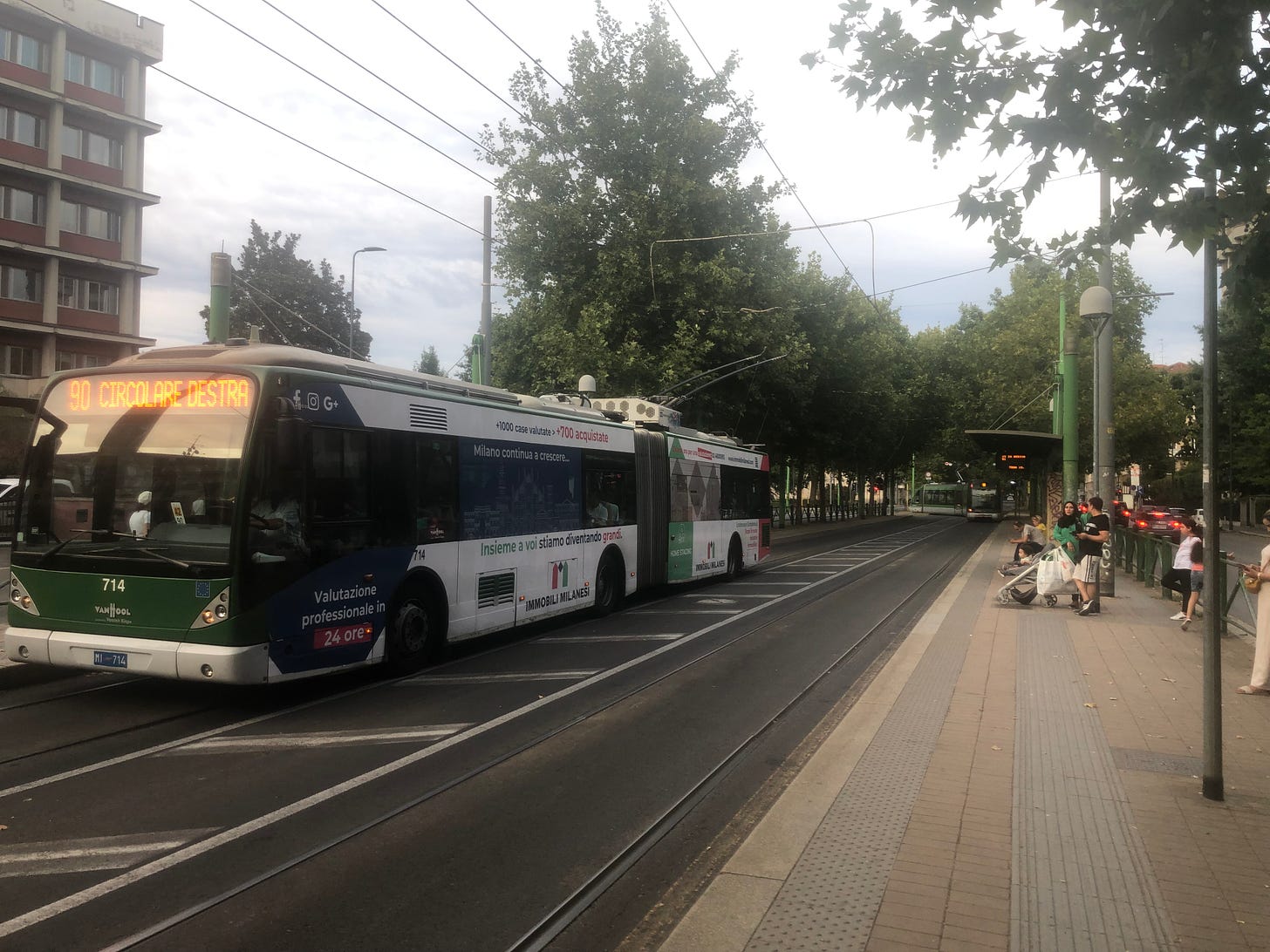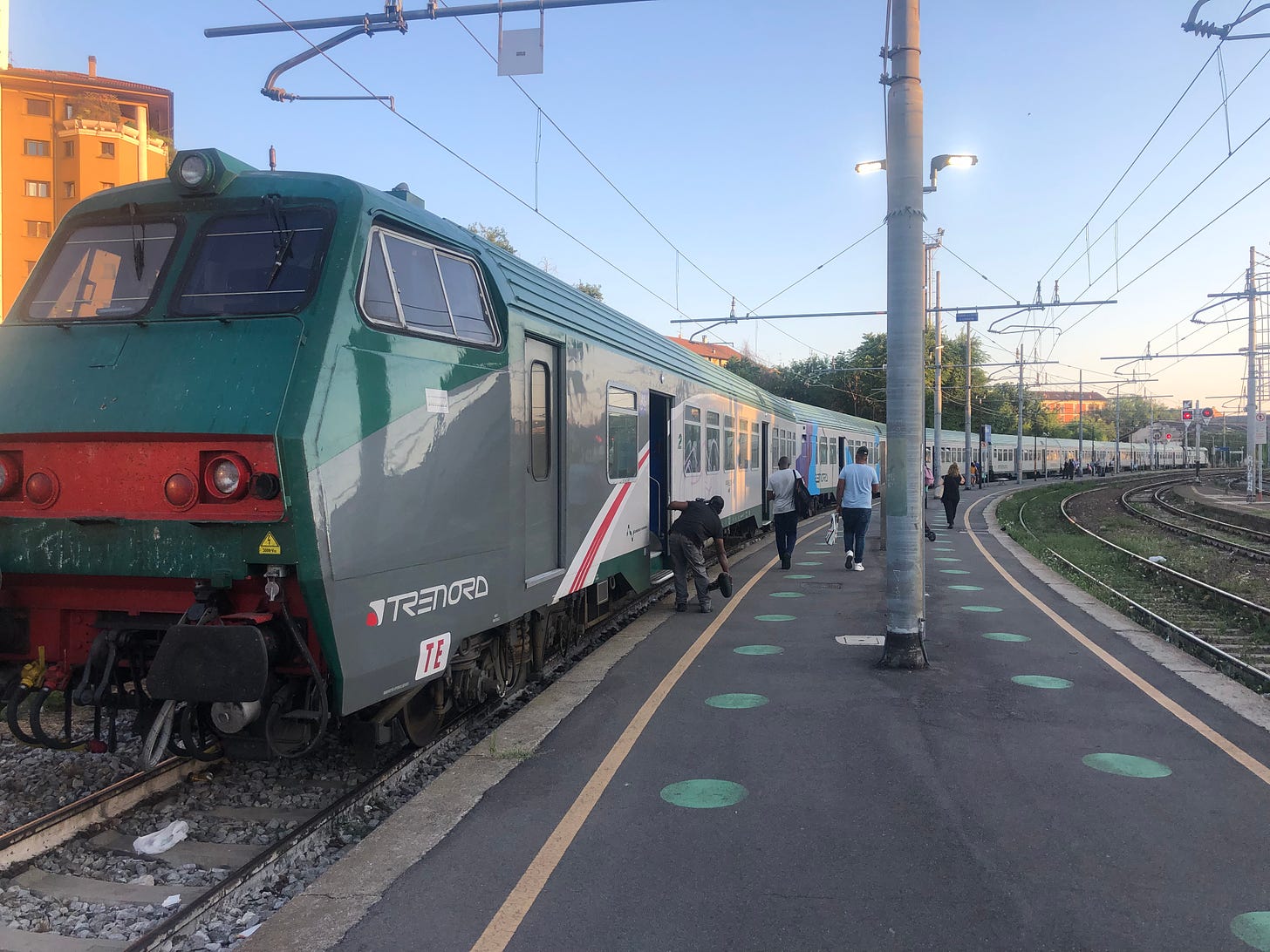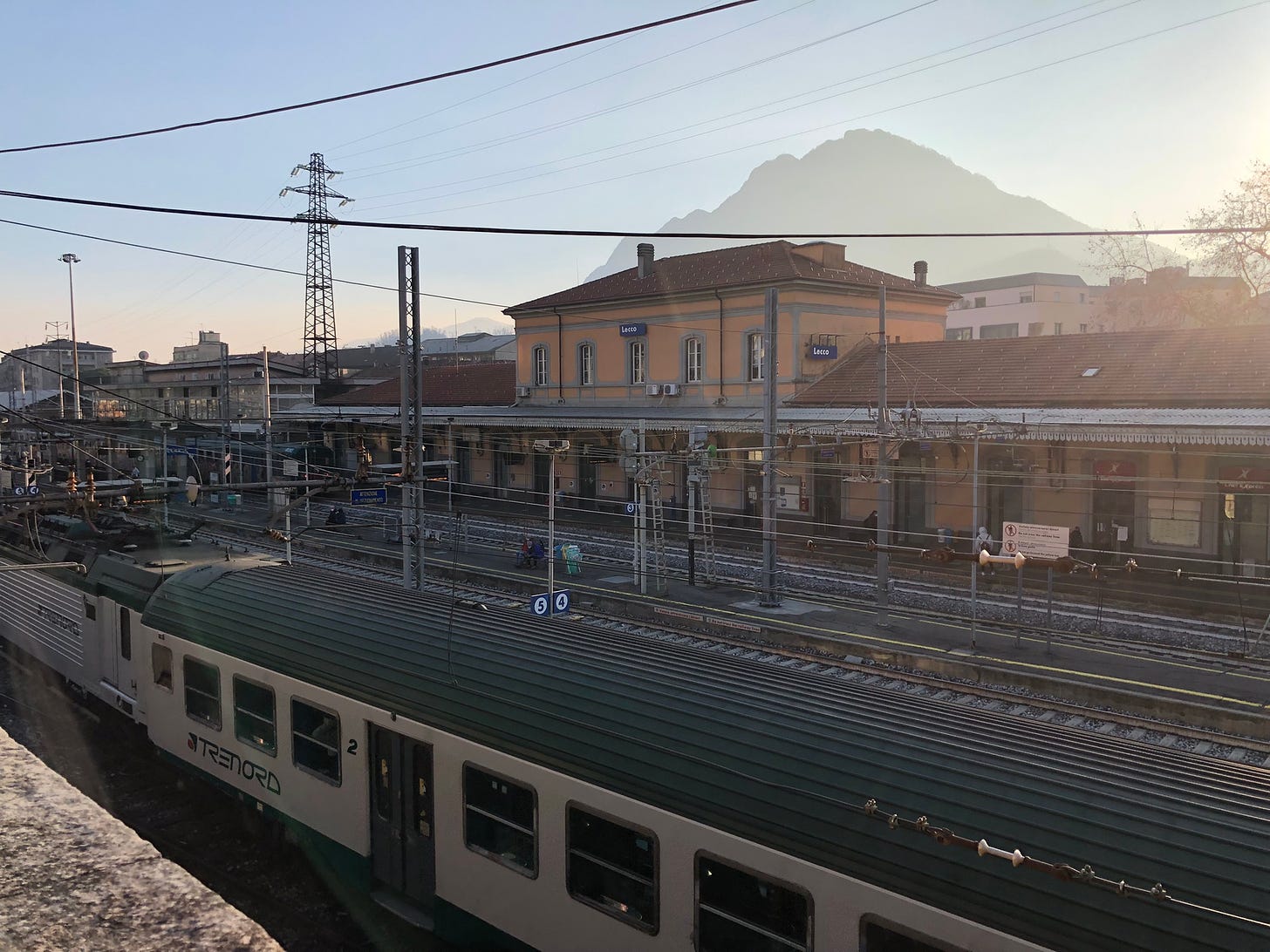Milan’s trolly bus 90: where a bump and a tug equal tears
Trains too have their wild side. In Italy, petit crime is part of life, best to keep eyes peeled
Three young men in cheap jeans and button-up shirts spy an Italian woman with glasses. She stands out. They do not.
No talk is needed, just a well rehearsed routine, with one at the back and two toward the middle, like a football backfield set for a reverse handoff.
Absorbed in texting aboard the trolly bus, the college kid’s purse dangles over a shoulder. With a good 10 stops to go, Mom and Dad will be waiting up, in the country where two phone calls home per day are appreciated.
Like coyotes setting up a mouse, the trio plays it cool on bus 90, casually strap-hanging as stops are made on the ring road to collect Milanese digesting happy-hour appetizers, blue-collar workers ending sweaty shifts, caregivers craving late dinners, and widowers guarding half-full grocery bags. Just the right moment is desired, preferably when the doors are about to close.
One of the crew nods to the other, who passes on the cue. Game on.
A bump and a tug spin the brunette, her right hand clutching the phone, yanked away by the third man in cyclone of chaos where riders get a split second to glimpse agile youth swooping in like owls on top of a rabbit, a quick fix to poverty in the land where a cup of coffee, for them, means hanging out beside a sidewalk vending machine. Who needs a café-made mochaccino, with all its fussy Romance-language protocol?
A whoop later, they leap through night cityscape, exalting in dialect before hurdling a median rail on Viale Stelvio. Nobody gives chase as the 90 lurches on.
All eyes turn to the Italiana. Not yet crying, she smacks at her pants pockets, but the cell is long gone.
Care kicks in among the couple Italians standing near her. “Signora, stai bene?”—Are you OK?
A step beyond the inner circle of sympathy, a North African offers apt advice, stoically voiced.
“Vai in Centrale”—Go to the central police station, where statements are taken 24/7. His expression, long on fatigue, speaks of having seen it all before. After uttering a faint “chuh,” he turns away.
Seeing the woman needs a phone, an Italian extends his hand to hers, beating a woman to the gesture. After mumbling “Grazie,” the victim takes it and makes the call.
“Papà, blocca tutto.”—Dad, block everything. They got it all.
Her voice cracks on “Papà.”
A diminutive Latina steps forward to give her a teddy-bear hug, which she gratefully embraces as the pair’s brown hair blends together. Compatriots lend ears to whatever she says, but it’s their eyes that tell the story.
In his thirties, the man who lent the phone looks on with the compassion of a big brother, lips pursing, eyes glancing back and forth at her, nodding ever so often. When Italians side with another’s sorrow, they absorb each other’s pain.
****
At least that’s how I’ve seen it during 19 years in Milan, where buses, trams, trains and the metro are part of my daily routine. As many as 40 rides a week contribute to my view on crimes and misdemeanors, including the one just written about.
Months ago, a high school classmate of mine requested a column on stark differences between U.S. and Italian culture. Crime is one. In Italy, it is often of the petit kind, as guns are hard to come by. Pickpocketing ranks high on the list, along with burglary, purse-snatching and bicycle theft, to name a few, without even getting into white-collar misdeeds.
Fresh immigrants sometimes receive unjust criticism for upticks in lawlessness. In the USA, Irish were despised, followed by the Italians, the Puerto Ricans, and a succession of other Spanish-speaking ethnic groups.
Some might say new arrivals commit their fair share of crime on Milan’s public transport, which has carried me through Milan’s richest neighborhoods and onward to its most dubious residential areas, namely: Giambellino, Quarto Oggiaro, Gratosoglio, Rozzano, Baggio and communities neighboring Sesto San Giovanni.
These six zones all have shiny corporate buildings where English is taught to white-collar professionals. Enter me as a teacher.
As an immigrant without a car who commutes to far-reaching work posts, I see the city’s wilder and humbler side, far removed from any glamor associated with designer clothes. On my rides, seats are shared with guys who could use a shower. Like any big city, Milan has plenty of troubles.
Part of the trouble is navigating its congested streets, but I take pride in getting around as well as some of Milan’s native born, many of whom rely on motorized vehicles with GPS. There’s nothing like hopping on an all-stops bus, and hoofing it, to swiftly learn a city’s landmarks, even a gray grocery store’s whereabouts.
Over all, Milan is pretty safe. Your chances of getting sucker-punched on a sidewalk or pushed from a platform are low. Eight years of riding New York City’s subway system, clear to its outer boroughs, including a school on Gunhill Road, loaded me with perspective.
For now, we’ll stick to Italy. Below is one more true tale on crime.
****
The Filipino mom could not shake off the urge for a snooze on the regional train carrying her home.
Saturday was payday, when the caregiver was compensated for a month’s worth of labor watching an old man’s every step, across trips to the bathroom and strolls through the park, with her elbow tied to his. He could be grumpy and clumsy but promptly paid cash to the tune of €700. With a kid and high rent, her family needed every cent.
Over the weeks, her Italian was getting better, she was networking with Milan’s sizable Filipino population, and her husband was getting more hours as a unit cleaner. Things were looking up, and tomorrow would be Sunday, her one day off, when spring-time barbecues with friends lifted her mood—too often preoccupied with paying bills.
“Remember to not put that wad of cash in your purse,” her husband had advised. “Use a ziplock bag, tuck it into your shoe and tie the laces tightly.”
That afternoon, at the precise moment the retired senior set the usual neatly inscribed envelope onto the kitchen table, she received a ring from a friend coordinating tomorrow’s grill. To boot, she would have to jog to the train station, thanks to a last-minute trip to a bodega to get toilet paper. Hassles, always hassles. There was no time to fiddle with a shoe, especially under the gaze of Giovanni, a prim and proper Milanese who might question why his envelope was being stuffed into a sneaker.
The zipper pocket within her trusty purse would have to suffice until she got rooted into her favorite seat, where she could stretch out beside a window. Today, she would dream of family gatherings in Manila.
Seated across from her in the middle car are an Italian mother and her kid daughter, along with a nanny, probably Latina, who speaks clean Italian.
The nanny quietly lectures the girl, not more than five years old: “No, one doll at a time, Martina. We are on a train, not in your bedroom.”
“Good,” thinks the Filipino, “they seem nice and are relatively quiet, for Italians.”
Drowsiness is setting in as the train shoots through Sesto, where hulking steel factories, skeletons of Milan’s industrial past, lull her closer to shuteye. “Should I slip off the shoe and wedge in the cash?” she wonders, sensing the eye of the girl on her. With just 20 minutes more on board, let it go.
A youth dressed in a short-sleeved checkered shirt buzzes through, rifling open car doors on both ends.
“There he goes again, what’s up with that?” she asks herself. Most rides she sees shiftless cats like him.
Across the aisle, the mama has taken note. “Sofia, I don’t like the way that man’s going back and forth. Move all the bags to the seats next to the window, Martina too.”
The Filipino rests the purse on her lap, looping one arm through its straps, a deterrent to mischief, briefly considered as her mind dozes off to scampi, prepared as only a Filipino could, smothered in Grandma’s buttery sauce and spiced to suit a princess’ palate. Oh, joy, for tomorrow’s picnic-table delights.
With the city of Monza approaching, she has a quarter hour more to rest and will need every bit of energy at home.
“Monza,” crackles the conductor’s familiar intercom voice, with the train coasting in. In her dream, Grandma is pulling at her arm.
“Sofia, stay back,” the mother yells, hoisting Martina into her arms, as the corridor cruiser rips away the brown vinyl purse from the Filipino’s clutches, weakened by her nod-off.
“Ladro!” the Filipino shrieks. Drooling spittle, she is five steps behind before even rising.
An Italian in his twenties throws down his knapsack, rushing out to the platform, in chase.
“Polizia,” cries out a man to the conductor, several cars up.
“There they are,” exclaims the Italian mother, pointing a finger. Martina, in tears, matches her decibel level.
As in film noir, two men are seen hurdling rails at twilight, with the purse-toting front-runner increasing his lead in the Monza railroad yard, eight tracks wide. Snaking around the back side of an idling Intercity train, he tosses the bag over a chain-link fence, plugging his left basketball shoe into an opening halfway up, before grasping its top.
Wiry, he vaults his right leg over in one swoop, three steps ahead of the Italian.
Only an ankle sprain can slow him down. Crashing through brambles, twigs snapping, he is soon an afterthought, as his pursuer calls it quits.
Inside the train car, a man in a suit and tie rears up at the sight of the bawling Filipino.
“That’s all my money for a whole month of work,” she sobs. “I had €700.”
By now, Martina has calmed down, taking in one of life’s new lessons, with her eyes fixated on the crushed Asian woman. Her stare is a child grasping a stranger’s hurt, an attempt at sympathy.
“Dai, ragazzi,”—Come on, guys—says the Italian in the dress coat. “We all saw what happened. Let’s help her out. Please accept €10.”
“Grazie molto,” says the Filipino, declining to borrow a phone to call home. A half dozen riders chip in.
Wide awake, she does a quick count. There’s €37 and fifty cents.
-30-






True, very true. iPhones are covered, though. You manage to get a password, and you got a person’s world.
Yes, the second story predates complete digital dominance, though cash today is still often used in Italy because it leaves no paper trail.